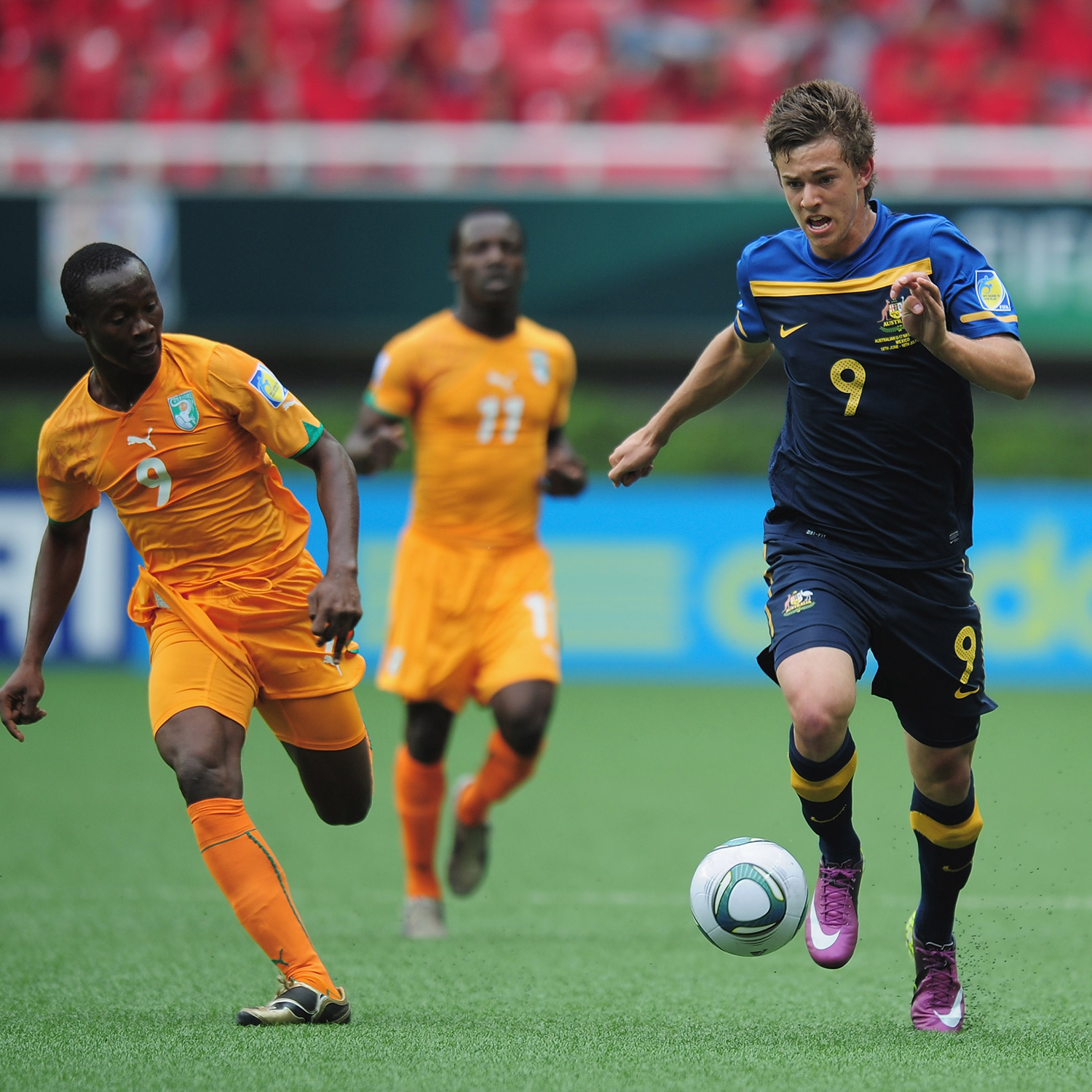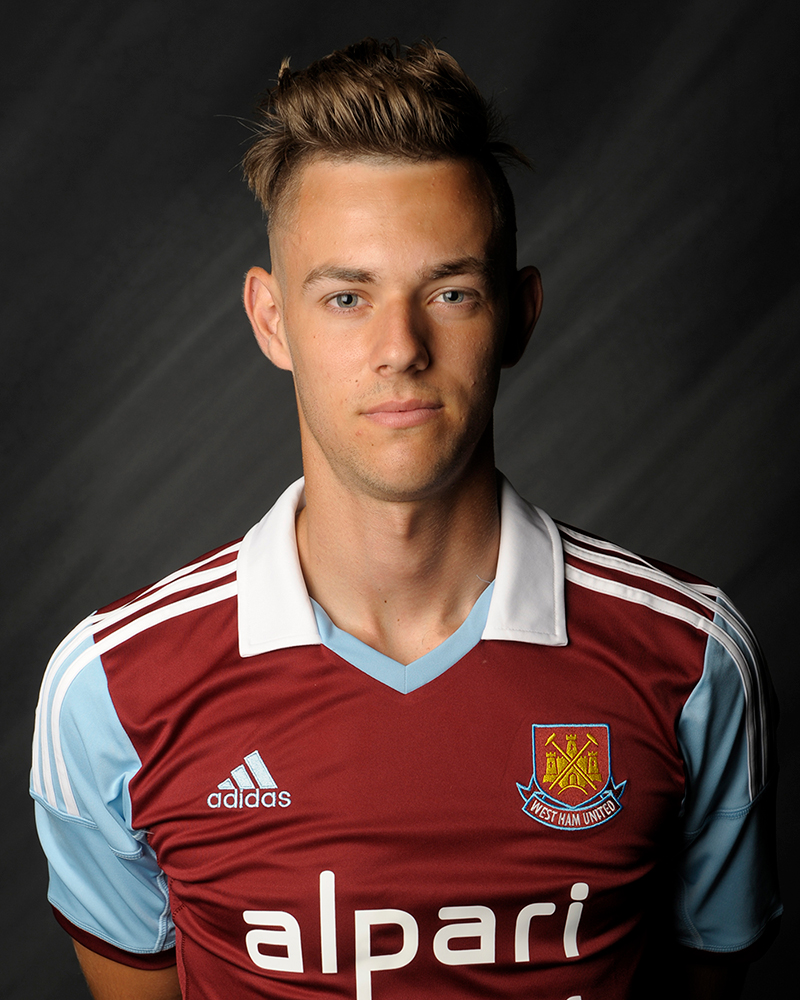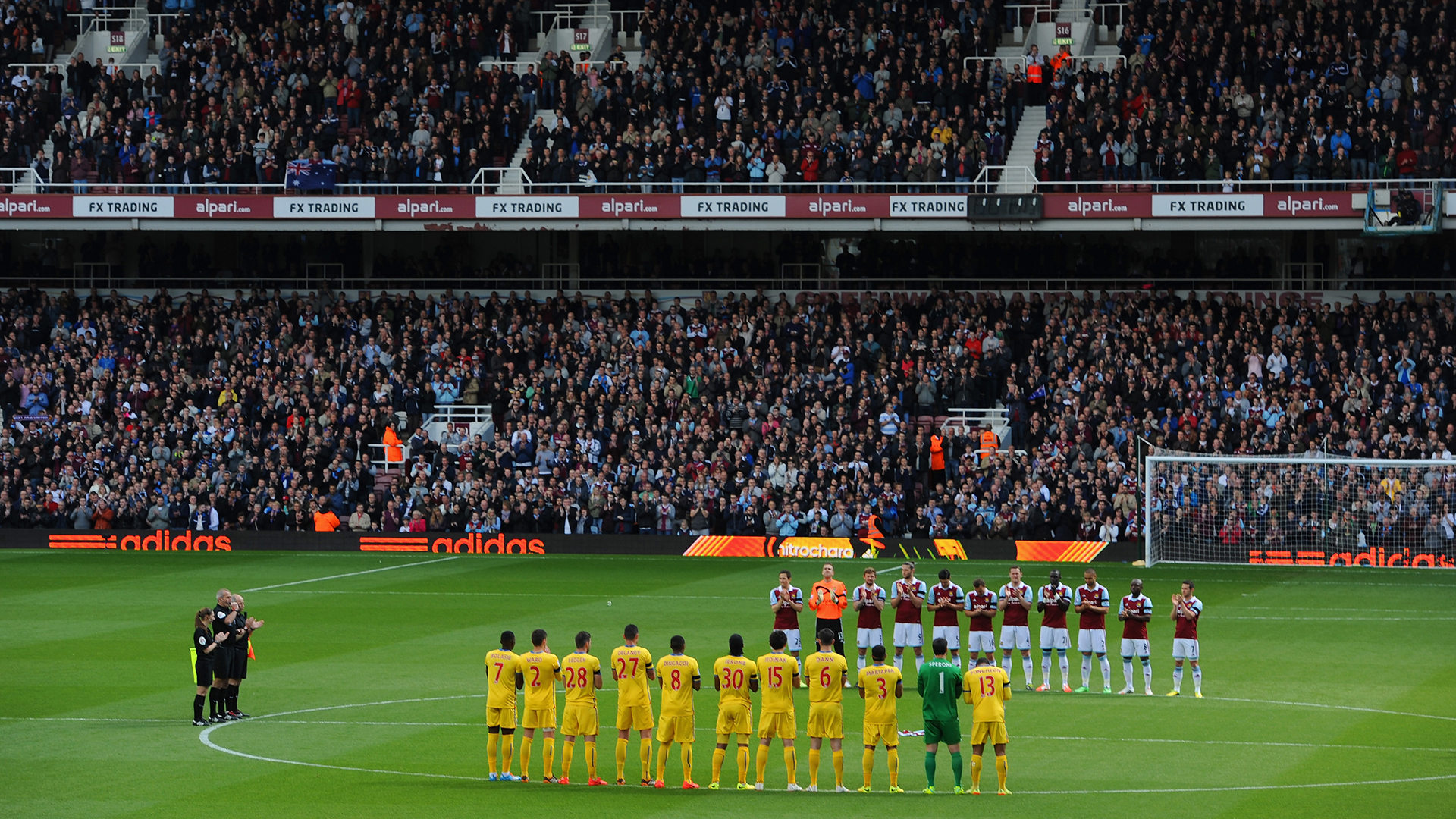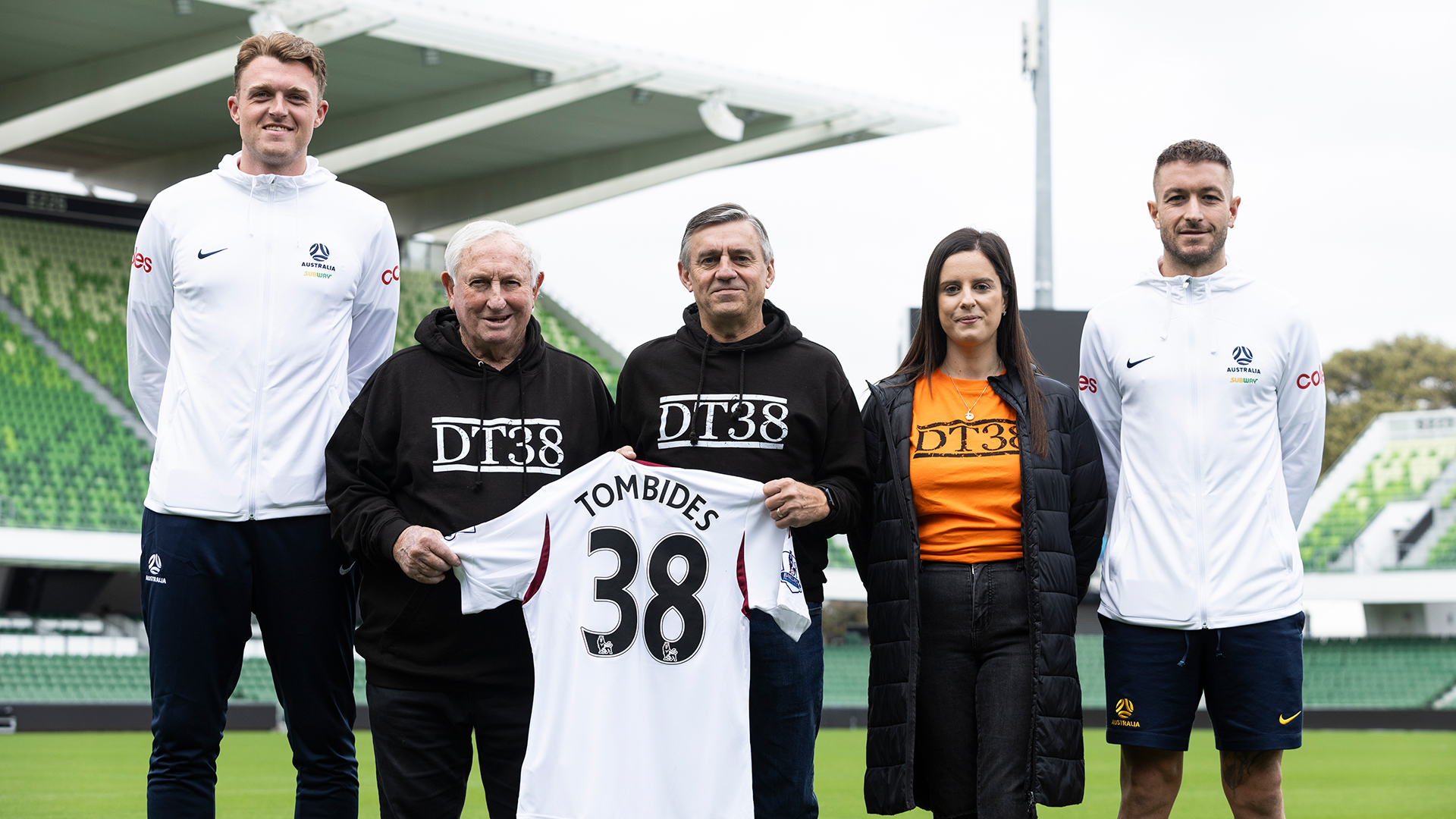Representing Australia at an elite level was always the dream for Dylan Tombides and he proved he had all the skills, work ethic and spirit required to play for his country.
- For more information about DT38, and to donate, visit: https://dt38.org/
In fact, never has a footballer embodied the desire and determination necessary to represent Australia more than Dylan. His willpower was truly inspiring.
You see, for all of his Australian youth team games, Dylan was playing with testicular cancer – that makes him our bravest ever footballer.
“He was definitely always the Aussie boy,” Dylan’s mum Tracy Tombides recounted.
“He wanted to fit in, but not at the expense of who he was, what he loved and who he believed in.
“He wanted to be recognized as Australian. He was proud to call Australia home.”
After growing up in Perth, he and his family moved to Macau when he was 13 and by the time he was 15, Dylan was playing in West Ham United’s academy.
He earned the call up to represent Australia at the U-17 FIFA World Cup in 2011 and went on to score in the opening game against Ivory Coast.

| 
|
However, a random drug test at the tournament, uncovered a tumour in one of his testicles and soon after it was confirmed he had testicular cancer.
In what was true Dylan fashion, he soldiered on, fighting the illness bravely for three years.
He made his professional debut for West Ham in September 2012, and in January of 2014 he represented Australia at the AFC U-22 Championships after intense chemotherapy just three weeks prior.
Sadly though, Dylan passed away with his family by his side on April 18th, 2014, at just 20 years-of-age.
Early footballing life
He had come a long way in his footballing career in a short space of time, and whilst he was a cancer patient, it was not that which defined him.
His journey on the pitch started in the suburbs of Perth at the age of five years old.
“His first year at competitive competition at Wembley Downs Soccer Club, and they had a little awards presentation for their 10 players,” Tracy said.
“The coach turned around and called Dylan up and he said, ‘This boy is going to play for Australia’.”
He went on to play for Stirling Lions in Perth before he and the Tombides family moved to Macau and Hong Kong.
Whilst there, he was spotted by scouts from West Ham and signed with the club in 2008 at the age of 15.
Tombides impressed at U-18 and reserve team levels and was included in the first-team squad for the first time when he was named as an unused substitute for the Barclays Premier League home fixture with Sunderland on May 22nd, 2011.
The same month, he was named Academy Player of the Year at West Ham United. His footballing ability was clear to see, as was a very bright future for the amiable Australian.
However, just a month later, at that U-17 FIFA World Cup in 2011, in which Dylan impressed once again, he learned he had testicular cancer.

Testicular cancer diagnosis
The tumour was discovered in a random drug test taken at the tournament, a moment which his mother Tracy said was heart breaking.
She said: “The Australian doctor phoned Dylan and Dylan saw the message had gone to voicemail and so he listened to it and phoned the doc up and he told him that he had failed a drug test and that he had taken a banned substance, or he had a tumour.
“So yeah, that was the conversation he had with me over the phone and I just I burst into tears afterwards.”
From that moment on he battled the disease with a level of fight that perhaps only he could.
“The very first few cycles of chemotherapy were really quite tough on him, I think from the very first day until they got his meds right, he was throwing up and vomiting,” she said.
“But invariably, he would turn around and just go, ‘Well, I'm going to fight this, I'm going to carry on’.”
West Ham professional debut
Dylan kept turning up to training at West Ham when he could, even if he was unable to train. Instead, he would, go down there and play pool, be in the gym, or just be doing rehabilitation, but he would always take his boots, just in case.
“He was just always around that environment (football), because it took his mind off what he was going through,” Tracy said.
“He soldiered on, there were very few times when Dylan would get annoyed and upset.”
His attitude to power on was rewarded on September 25th, 2012, when he made his senior West Ham debut in a League Cup match against Wigan Athletic at the age of 18 years and six months.
Iconic football manager Sam Allardyce was the man who handed Dylan his first team debut.
Speaking on what Dylan was like, Allardyce said: “He was one of the bravest characters I have ever met.
“Football was his life, and he didn't miss a day's training even when he wasn't fit enough to train because of his treatment.
“He had an incredible hunger for life and put up such a great fight to try and live and continue to play football.”
Playing for Australia against all odds
Unfortunately, Dylan’s illness ruled him out of selection for the U-20 FIFA World Cup in 2013, and that was news that left him inconsolable.
“His cancer was very aggressive, it was very rare, and I remember when Dylan was working really hard to go to the under 20 World Cup and he got the devastating news that it had metastasized in his liver,” Tracy said.
“That was the most devastated I saw Dylan in the whole process. For a mum to listen to your son sob uncontrollably and there was nothing you could do, it's heart breaking.”

Despite facing this terrible setback, and much more aggressive cancer treatment, Dylan was adamant to play for Australia once more.
“In the middle of November (2013), Dylan had a three-week cycle of chemotherapy, and then got as good as he possibly could, trained really, really hard so he could join his teammates in January (2014) in Oman,” Tracy said.
At that U22 tournament, Dylan played his heart out and showed once more the skillset and fight he was known to possess.
He did don a new look for the tournament, as the treatment had caused most of his hair to fall out.
Tracy said: “He didn't care what he looked like, all he wanted to do was play football, and representing his country was a huge thing for him, it was a real sense of pride.”
Unfortunately, that would be the last time Dylan would play football as when he returned to London, he was told his condition was incurable.
Dylan passed away on the morning of April 18th, 2014, with his family at his bedside – just three months after his final appearance for Australia.

Legacy and DT38 Foundation
The day after his passing, Dylan’s father Jim and brother Taylor, laid a shirt on the centre spot at the Boleyn Ground which carried Tombides' squad number 38 and his name.
West Ham United announced that this number would be retired from future use, an honour only shared with fellow club legend Bobby Moore.
“What a huge honour, that's not even a decision that's made within a 24-hour thing, no, they just went bang, we’re retiring this young man shirt,” Tracy said.
“They (West Ham) organised Dylan to be brought home, from Germany, they organised Dylan to be taken over to Perth.
“They did everything, and I will be eternally grateful for all the support they gave Dylan and the family.”

In February 2015, the Tombides family launched DT38 Australia, a charitable foundation with a vision to change the way testicular cancer is diagnosed by implementing best practice diagnostic guidelines for patients who present with testicular symptoms.
Currently both Mile Jedinak and Daniel Garb are ambassadors for the charity in Australia.
The pair, along with the work from Dylan’s family, have helped grow the foundation and its message far across the world.
“I'm proud to say that we're branching out into lots of countries, we've got ambassadors in Canada, we've got ambassadors in Malaysia, we've got ambassadors throughout Europe,” Tracy said.
“We cross over codes, we cross over to motor racing, we cross over to nutritionists. We're very fortunate that people understand the message and what we're trying to do.”
Socceroos pay tribute in Perth
On Tuesday, 13 June, the Subway Socceroos paid tribute to Dylan at their FIFA World Cup Qualifier against Palestine in Perth.
Players, staff and supporters all honoured Dylan's memory over the course of the evening as part of the 10-year anniversary of his passing.
Several initiatives were planned as part of DT38 Australia's involvement in the Subway Socceroos match against Palestine, in which Australia won 5-0.
During the warm ups, the Australian players all wore commemorative shirts with Tombides and his number 38 on the back.
As well as that, on the 38 minute mark, the crowd gave a minutes applause to remember the hometown lad.
Also, a number of match-worn jerseys were made available for auction as part of fundraising efforts from the Socceroos to support the work of DT38 Australia after the match.
Subway Socceroos Head Coach, Graham Arnold said: “While many of our current squad didn’t play in junior national teams with Dylan, they crossed paths with him at different times and of course know his story and the work of DT38 Australia very well – it’s a cause and an organisation close to the heart of all Australian footballers.
“I’m pleased we can play a small role in supporting the Foundation’s ongoing work and contribute to spreading their message on testicular cancer awareness for men of all ages."
- For more information about DT38, and to donate, visit: https://dt38.org/
